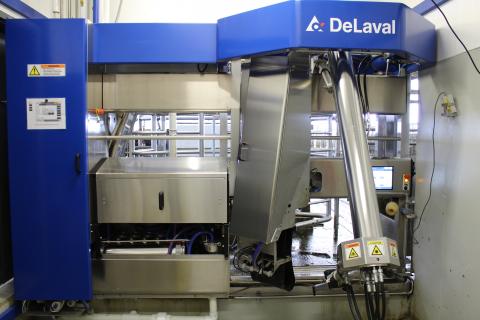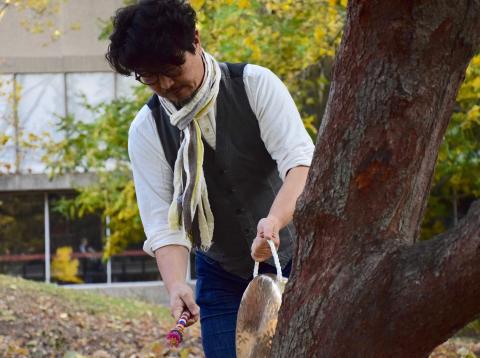- About the Office of Research
- Welcome Message
- Meet the Vice-President (Research)
- Strategic Research Plan
- Mission Statement
- Services and Divisions
- Discover our Research
- Research Chairs
- Facts and Figures
- Centres, Institutes, and Groups
- International Research
- Find a Researcher
- For Researchers
- Safeguarding Research
- Commercialization Policy and Framework
- Equity, Diversity, and Inclusion in Research
- Research Alerts
- Funding
- Ethics and Regulatory Compliance
- Research Integrity and Conflict of Interest
- Patenting, Licensing, and Commercialization
- Honours and Awards
- Ontario Agri-Food Innovation Alliance
- Other Considerations and Resources
- Forms, Policies, Guidelines, and Procedures
- Interactive Support Sessions for Researchers
- Research Administration Information Management System (RAIMS)
Data Science: Connecting communities through creativity

By Sydney Pearce and Caitlin Ford
Mitigating COVID-19 isolation for vulnerable seniors and children is the goal of an innovative project led by a University of Guelph history professor.
Launched during the pandemic by Dr. Kim Martin, Connecting Generations Art Journals is intended to bring together two groups that have been especially vulnerable to...
Data Science: Social media as a disease detection tool

By Mya Kidson
University of Guelph research suggests that Twitter’s big-data capabilities make it useful for improving disease surveillance and public safety.
Dr. Rozita Dara, a computer science professor in the College of Engineering and Physical Sciences, and Dr. Shayan Sharif, a pathobiology professor at the Ontario Veterinary College, have created a system that combines machine...
Data Science: Promoting early disease detection in robotic milking systems

Robotic milking systems can lead to early disease detection in dairy herds.
By Sydney Pearce and Cate Willis
Analyzing thousands of robotic milking system records has taught University of Guelph dairy researchers a vital lesson—cow behavioural changes documented by such systems can help predict certain disease events earlier.
On-farm, these systems can let farmers know that cows are unwell up to four days or more before milk yields drop, allowing farmers to intervene sooner, says Dr. Trevor DeVries, a professor in the Ontario Agricultural College.
Meagan King, a former post-doctoral...
Data Science: Taming the complicated world of wheat genetics

Healthy wheat (above) as seen under a microscope; unhealthy wheat (right).
By Samantha McReavy
Using high-performance computing (HPC) power provided by the SOSCIP consortium cloud services, researchers at the University of Guelph are identifying novel genes linked to disease resistance in wheat to develop a robust crop variety. Disease-resistant varieties make better use of farmers’ resources.
Post-doctoral researchers Soren Seifi and Mina Kaviani and senior scientist Mitra Serajazari in the Department of Plant Agriculture...
Data Science: Protecting water on agricultural land

GIS mapping is helping to create effective management strategies to protect the environment.
By Alicia Bowland
Bayfield, Ontario, a waterfront community on gorgeous Lake Huron, is cottage country to some. But to others, it’s the home of the Gully Creek and Bayfield North watersheds, comprising 40 square kilometres of natural, recreational and agricultural land whose waterways drain into the lake.
And data is helping keep it pristine.
Watersheds—areas of land that drain water and snowmelt to rivers and lakes —are vital for supporting habitats and water conservation but can often collect...
Data Science: Sustainable and profitable

By Samantha McReavy
Improving the sustainability of farms while maintaining profitability is essential to protect the livelihood of farmers and the health of the planet. Farmers need to be profitable to stay in business. But they also need to look after their farms to keep producing food for the long run.
That’s where profitability mapping comes in. These maps show farmers an estimate of how much money they are making—or losing—on specific areas of their farm.
Virginia Capmourteres, formerly a research...
Data Science: The world of artificial intelligence

Kindred, co-founded by Prof. Graham Taylor, is a robot that can manage warehouse organization.
By Samantha McReavy and Mya Kidson
Artificial intelligence (AI) technology is all around us—although we may not always be aware of it—from self-driving cars to online product recommendations, practical speech recognition, text prediction and even the development of a globally accessible COVID-19 antiviral pill. AI is constantly being used to improve lives.
Dr. Graham Taylor, an engineering professor at the University of Guelph and interim Research Director at the Vector Institute, is working to improve AI technology...
Data Science: Strengthening automotive safety with in-lab technologies

DRiVE lab is led by Prof. Lana Trick (left), pictured here with students Heather Walker and Rylan Waring.
By Samantha McReavy
A high-tech driving simulator at the University of Guelph is using data to improve driver safety by identifying factors and behaviours that increase the risk of collisions.
The University of Guelph DRiVE lab (Driving Research in Virtual Environments) is led by Drs. Lana Trick, Department of Psychology; Andrew Hamilton-Wright, School of Computer Science; and Michele Oliver, School of Engineering. The lab houses a driving simulator—a full car body surrounded by viewing...
Data Science: The Multidisciplinary Impact of Improvisation

Korean percussionist Dong-Won Kim at a ground-turning ceremony for U of G’s MacKinnon Building renovation and its new ImprovLab.
By Sydney Pearce and Cate Willis
Dr. Ajay Heble, School of English and Theatre Studies, founded the International Institute for Critical Studies in Improvisation (IICSI). This partnered research institute looks into how artistic improvisation can be a model for social change, and how improvisatory practices can benefit community health and technological communication through engagement and collaboration.
“It’s exciting to see how members of the IICSI research team are engaged in the creation and development of digital tools and...
Data Science: Compusense

Compusense today: measuring and constantly striving to improve.
By Alicia Bowland
Compusense makes software for conducting sensory research and consumer studies. The Guelph-based company was founded in 1986 by Chris Findlay, an adjunct professor in the University of Guelph’s Department of Food Science.
Various consumer products and their surroundings convey sensory properties that consumers respond to differently. Sensory research measures consumer response to a stimulus.
“Step...
Who We Are
The Office of Research oversees a $186 million research enterprise across seven colleges, our regional campus at Ridgetown, 15 research centres, and the University of Guelph/Ontario Ministry of Agriculture, Food and Rural Affairs Agreement. We are committed to supporting the research programs of University of Guelph faculty across all disciplines.